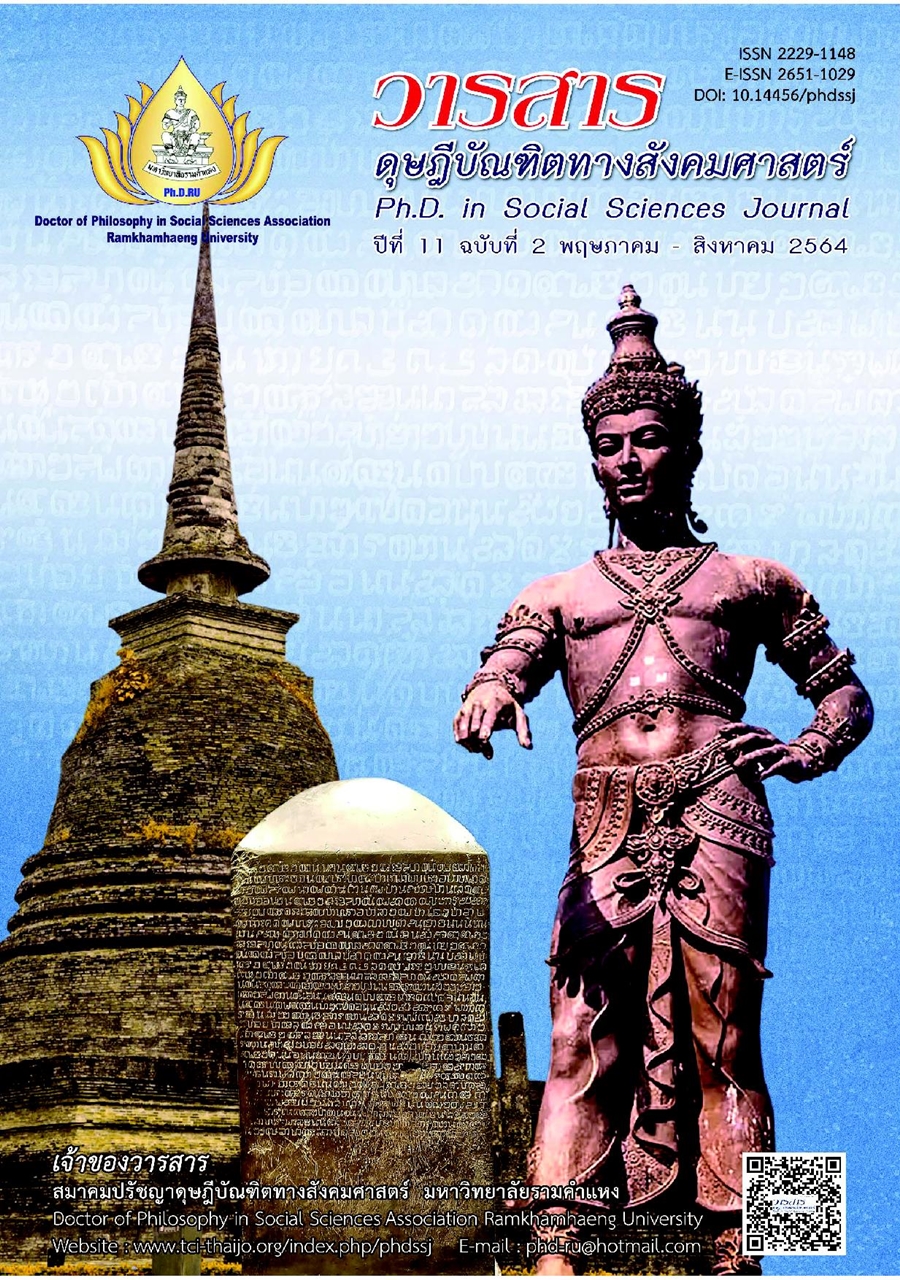The Policy Formulation for Cosmetic Herbal Industry of Product Upstream in the Eastern Economic Corridor
Main Article Content
Abstract
This research article aims to: (1) analyze the capabilities of the industry (2) study the guidelines for industrial development (3) formulate policies for the development, promotion and support of the herbal group industry for cosmetic product upstream in the eastern economic corridor. By using qualitative research in in-depth interviews and group interviews with key informer who are interested in the development of the herbal industry. Upstream products consist of entrepreneurs, officials, government agencies, experts, a total of 40 people using content analysis information methods.
The results of the research are as found that: (1) The capabilities development of the herbal industry in upstream products for cosmetics category is the image production development in support for extracts production standards and upstream products certification in the development of policies to solve the upstream products shortage for Thai cosmetic products. (2) The alignment for development of herbal industry for upstream cosmetic products that is development of potentials for linkages, capabilities, building an industrial network with supervision, development criteria and risk management related to herbal extract products in production development research and develop data centers Test center development and develop a center to certify nonstate products. And (3) The Policy formulation for the development, promotion and support of the herbal group industry for cosmetic product upstream in the eastern economic corridor.
Article Details
Academic articles, research articles, and book reviews in the Ph.D. in Social Sciences Journal are author’s opinions, and not the publisher’s, and is not the responsibility of the Ph.D. in Social Sciences Journal Philosophy Association, Ramkhamhaeng University. (In the case that research is done on human, the researcher has to be trained in Ethics for Doing Research on Human Training and has to produce the evidence of the training).
References
Boonsom, T., & Dechbumroong, P. (2016). Standard of herbal raw materials in manufacturing. EAU Heritage Journal Science and Technology, 10(2), 17-27. [In Thai]
Bowen, P. G., Bryant, P. H., Hess, A., McCarty, K. H., & Ivey, J. B. (2014). Modifying public policies to combat obesity. The Journal for Nurse Practitioners, 10(2), 100-106.
Bureau of Agricultural Commodities Promotion and Management. (2015). Situation of production and marketing of medicinal plants. Author. [In Thai]
Cheamsawat, N., Lertpenmeta, P., Kaweenantawong, N., & Hasaro, K. (2009). Development of a packaged SBR wastewater treatment system for food industries. Thailand Research Fund. [In Thai]
Connell, J., Kriz, A., & Thorpe, M. (2014). Industry clusters: An antidote for knowledge sharing and collaborative innovation?. Journal of Knowledge Management, 18(1), 137-151.
Dror, Y. (1968). Public policymaking reexamined. Chandler.
Dye, V. (2011). Reflection, reflection, reflection, I’m thinking all the time, why do I need a theory or model of reflection?. In D. McGregor & L. Cartwright (Ed.), Developing reflective practice: A guide for beginning teachers (pp. 217-234). McGraw-Hill.
Feser, E., & Bergman, E. (2000). National industry cluster templates: A framework for applied regional cluster analysis. Regional Studies, 34(1), 1-19.
Jadesadalug, V., & Kamraman, W. (2017). The competitive advantage strategy of One Tambon One Product case study: Herbal Dabber Village, Amphur Phrapadaeng, Samutprakarn Province. Veridian E-Journal, Silpakorn University, 10(3), 2007-2026. [In Thai]
Jaikaew, A., Wingwon, B., & Panphae, P. (2015). The integrated potential of manufacturing business strategies influencing the competitive advantage of Lanna Enterprises Cluster in Thailand. Journal of Management Science Chiangrai Rajabhat University, 10(2), 108-139. [In Thai]
Jepson, P. R., & Arakelyan, I. (2017). Developing publicly acceptable tree health policy: Public perceptions of tree-breeding solutions to ash dieback among interested publics in the UK. Forest Policy and Economics, 80, 167-177.
Jones, B. D. (2017). Behavioral rationality as a foundation for public policy studies. Cognitive Systems Research, 43, 63-75.
Ministry of Public Health. (2013). Strategic plan of Ministry of Public Health (B. E. 2556-2559). Author. [In Thai]
Nakornchaikun, K. (2017). Marketing factors affecting customer’s behavior of processed herbal products in Ubon Ratchathani. Journal of Management Science, Ubon Ratchathani University, 6(12), 28-42. [In Thai]
Office of the National Economic and Social Development Council. (2017). Eastern Economic Corridor (EEC). Retrieved from https://www.nesdc.go.th/ewt_w3c/ewt_dl_link.php?nid=6382 [In Thai]
Ortiz, S. E., Zimmerman, F. J., & Adler, G. J., Jr. (2016). Increasing public support for food-industry related, obesity prevention policies: The role of a taste-engineering frame and contextualized values. Social Science & Medicine, 156, 142-153.
Porter, M. E. (1998). Competitive advantage: Creating and sustaining superior. Free Press.
TambunlertchaiMaterial, S. (2015). The future for Thai industry. Ministry of Industry. [In Thai]
Thaennin, N. (2012). A model of participatory public policy process in agricultural and food safety management in Changwat Songkhla. Doctoral Dissertation of Philosophy in Environmental Management, Prince of Songkla University. [In Thai]
Thammarungsri, S., & Rungpragayphan, S. (2016). Data management in herbal medicinal products manufacturing processes: Documentation, batch processing record and electronic data management. Isan Journal of Pharmaceutical Sciences, 12(2), 44-56. [In Thai]
Wachirapanyapong, S. (2018). Strategy of efficiency of community business in privatization of herbal products in Lopburi Province within the Asean Free Trade Area. Journal of Graduate Studies, Valaya Alongkron Rajabhat University, 12(1), 191-203. [In Thai]
Wan, C., Shen, G. Q., & Choi, S. (2018). Differential public support for waste management policy: The case of Hong Kong. Journal of Cleaner Production, 175, 477-488.
Wnlam, P., Morachat, C., & Jungvimutipan, K. (2017). The development of the operational capacity of the non-food herbal One Tambon One Product (OTOP) groups. Humanity and Social Science Journal, Ubon Ratchthani University, 8(2), 207-238. [In Thai]


